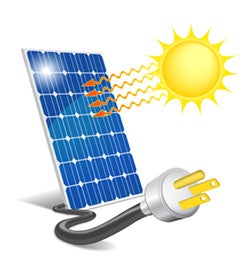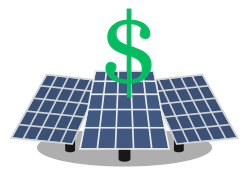Answers to all your questions about solar panels
Difference between PV solar panels and solar thermal panels
Incentives to install solar panels
Solar panels cost data
Most installed solar panels (market leading brands)
Last updated by Andrew Sendy
Solar panels types

Photovoltaic solar panels
Essentially solar panels contain solar cells in which electrons are excited by the irradiation in sunlight and this movement of electrons is harnessed as electricity.
Read the difference between Monocrystalline and Polycrystalline solar panels.
Read the difference between Monocrystalline and Polycrystalline solar panels.
See the advantages of thin film solar panels.

Solar Thermal solar panels
There are also other types of solar panels that use the heat in sunlight to create energy. This is known as solar thermal solar panels and are used mostly in solar water heaters.
Get prices for systems with different brands of panels
Everything you need to know about installing solar panels in your state
Incentives to install solar panels
The best way to see all of the incentives that you are eligible for if you install solar panels on your home is to use the 'Solar-Estimate' solar calculator.
A 30% solar tax credit is available to home owners who decide to install solar panels on their home. Any prices you read on this site are usually expressed before this 30% tax credit applies.
The 30% federal tax credit for solar energy systems was extended in August 2022 for another ten years. Both residential and commercial customers can take advantage of this tax credit, and it applies to all three major types of solar technology; photovoltaic, solar heating & cooling, and concentrating solar technology. However, to take advantage of this tax credit you need to have federal withholding tax payable for the year.
In addition to the federal tax credit, many states, counties, municipalities and utilities offer rebates or other incentives for solar energy technologies. Your installer will be able to provide the most up-to-date information on solar incentives. The Database of State Incentives for Renewable & Efficiency (DSIRE) has a comprehensive list of solar incentives by state, as well as more information and maps showing solar policies across the U.S.
Find out how much state solar incentives will save you
Most installed solar panel brands
Find the most installed panel brand in your state
Most Reviewed solar panel brands
Get prices for systems with different brands of panels
Useful links
Solar panel are a big purchase with a long term payback. As such they involve a more careful consideration of the advantages of installing solar panels and the disadvantages of installing solar panels than what is the case with other consumer purchases.
However, in most instances regardless of the solar company you use, the solar panels you choose or the payment method you choose (cash, home equity loan, lease or PPA) the financial advantages of installing solar generally outweigh the risks or disadvantages.
How much do fully installed solar power systems cost?
Solar Calculator
A solar panel calculator answers the following questions:
How many solar panels do I need?
How long does it take to pay back the cost of installing solar panels?
Likely cost for the solar power system you need to cover your bill?
What solar incentives are available in my area and how much will they save me?
How much power solar panels produce?
How much will I save if I get solar panels installed?
There are two leading solar calculators in the US
PV watts Solar Calculator is the best solar calculator for determining the exact amount of power that solar panels will produce because it can take into account the pitch and exact direction of your roof. However, it is less useful as a solar cost calculator or as a savings or payback calculator because it does not have up to date market cost date or data about incentives.

Solar-Estimate Solar Calculator is the best solar calculator for calculating solar costs, solar savings and solar payback periods but assumes that your roof is an optimal solar roof (facing south and 22 degree pitch). It actually uses the PV Watts solar irradiation and production data (as most solar calculators in America do) but the advantages of the Solar-Estimate calculator over others is that it has incentive data and your utilities rate structure built into its database. It also has pricing data from around 200 installers around America making its assumptions as to cost, savings and payback far more realistic that any other solar calculator.
Data from the Californian government solar website shows that users of Solar-Estimate in California on average purchased their solar systems at almost $1 per watt less than the statewide average cost for residential solar systems. This amounts to a saving of around $5,000 on a standard 6kw solar system. The Solar Energies Industry Association recommends the Solar-Estimate Solar Calculator for use by consumers.
Find the 'best solar company' for you
It is a big mistake to think that all solar companies are alike. There is a vast difference between mom and pop local solar companies and the largest solar sales juggernauts such as SolarCity and Vivint Solar.
You can see from the SolarCity and Vivint reviews that these companies have much worse reviews than the average consumer reviews score for small and mid-sized solar companies. However, these companies have used financial structuring to offer Americans that do not have the cash available to buy solar, or do not have the federal withholding tax liability to use the 30% solar tax credit, the ability to buy solar with zero down and a monthly payment lower than the monthly savings the system generates. As such we say that they have contributed greatly to the growth of the solar industry.
It should also be noted that these zero down lease and PPA options are not necessarily the best way to maximize your solar savings. Typically your savings will be much more if you can afford to buy the system, either with a cash payment or a HELOC loan. See: Pros and Cons of Buying Solar v's Leasing Solar v's PPA agreements


Solar panel kits
There are two types of people that buy solar kits. There are those that wish to contract a solar skilled electrician to install the kits for them and by doing so end up installing solar panels at a lower cost than what are charged by solar companies and there are those that actually want to physically do the installations themselves to save even more money.
However, there are fire and electrical safety risks with the DC electricity produced by solar panels. There is also the OH&S risks associated with general roof and electrical work for those not trained in these areas. There is also the pitfall that you will have to do all your own city and utility compliance paperwork yourself and that you may damage the equipment in installation (voiding your warranty).
If you are considering buying a solar panel kit and doing DIY solar you really should read this article first. It's possible, but its hard and has its own risks: Pros and cons of buying DIY solar panels
How much does it cost to buy a solar panel kit?
Upload your solar quote to see who will beat it
SolarReviews and its sister sites www.solar-estimate.org and www.solarpaneltalk.com together make the largest solar community on the web. We have data on over 450,000 solar installations and get live pricing data in every day from around 200 solar companies.
Upload an existing quote and we can instantly tell you if that system has ever been installed at a lower cost.

Consumer
Have you negotiated a great deal on a solar system?
Upload your solar system quote and we will show a cheaper comparison quote*
* If we have a similar or closely matched quote.

Installer
Want to advertise your great solar deals for free?
Upload your solar systems and we will share your solar deals with solar consumers.




.png)








